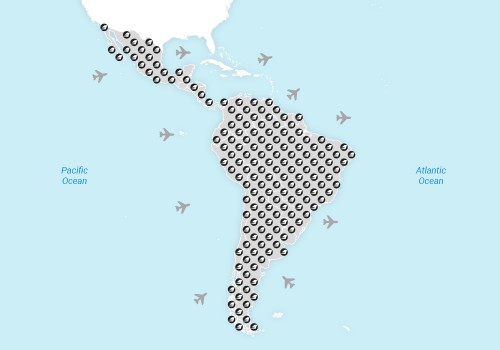Where in the world can you say “Airplane” in 800 languages?
From time-to-time we will be featuring a guest blogger. For this blog, I am pleased to go a little off the beaten track and present aviation from another obscure location, but this time in the Southern Hemisphere.
Our Euro Jet Operations Control Center staffer, plane spotter, and first class travel expert Jacob Pfleger presents in his first blog appearance some observations about Papua New Guinea. For those of you confused about where this is, just remember it used to be a part of Melanasia. That should confuse you even more.
Here goes…..Enjoy and thank you Jacob for the piece:
 As part of my annual vacation this year I had the opportunity to spend a week in Papua New Guinea (PNG) with one of my friends who is a pilot there. The country is located just north of the northernmost tip of Australia (Cape York), originally an Australian colony the country gained full independence in 1975.
As part of my annual vacation this year I had the opportunity to spend a week in Papua New Guinea (PNG) with one of my friends who is a pilot there. The country is located just north of the northernmost tip of Australia (Cape York), originally an Australian colony the country gained full independence in 1975.
PNG is one of the most culturally diverse countries in the world with over 800 languages and at least as many traditional societies. the official population figure is just over 6 million. During 2011 PNG's economy was the 6th fastest growing in the world, driven largely by the ever expanding resource industry.
Due to its size and terrain extremities (some mountains have peaks up to 16,000ft) and the lack of proper infrastructure, the aviation industry plays an integral part in sustaining the countries economy.
I have never come across a country more heavily reliant on aviation then PNG.  For example the flight time between Lae and Bololo is 18 minutes when compared to a 7 hour journey on roads that barely pass as dirt tracks. Everything imaginable is transported by air from food, mining equipment, household supplies right through to coffins. Surprisingly coffin charters are one of the most popular charters in PNG as the deceased's remains are often transported back to their birthplace, often in very remote locations where the only viable form of transport is by air.
For example the flight time between Lae and Bololo is 18 minutes when compared to a 7 hour journey on roads that barely pass as dirt tracks. Everything imaginable is transported by air from food, mining equipment, household supplies right through to coffins. Surprisingly coffin charters are one of the most popular charters in PNG as the deceased's remains are often transported back to their birthplace, often in very remote locations where the only viable form of transport is by air.
It is not just the local aviation industry which is booming but the rate of VIP and corporate movements is also on the rise with over 150 movements recorded last year in Port Moresby, a result of brought of the abundance of natural resources and mining industry.
When discussing aviation operations in PNG, “challenging” is an understatement. Its daunting terrain and unpredictable weather conditions make for a very dangerous combination. I had the opportunity to ride on a jump seat into Mount Hagen PNG's third largest city which is about a 1.5 hour flight from Port Moresby. The field has an elevation of 5380ft making it one of the highest in the country. The approach requires a steep descent over a mountain ridge and then a visual approach through a valley with peaks in excess of 14,000ft before finally executing a final approach to the airports runway. The flight gave me an excellent first hand understanding of not only the dependence the communities have on the aviation link but also the relative risks associated with providing the service. This is all made more complicated by lack of infrastructure with only one airport certified for night operations and radar coverage extending to only 120 nautical miles from Port Moresby.
I had the opportunity to ride on a jump seat into Mount Hagen PNG's third largest city which is about a 1.5 hour flight from Port Moresby. The field has an elevation of 5380ft making it one of the highest in the country. The approach requires a steep descent over a mountain ridge and then a visual approach through a valley with peaks in excess of 14,000ft before finally executing a final approach to the airports runway. The flight gave me an excellent first hand understanding of not only the dependence the communities have on the aviation link but also the relative risks associated with providing the service. This is all made more complicated by lack of infrastructure with only one airport certified for night operations and radar coverage extending to only 120 nautical miles from Port Moresby.
As with flight operations, ground operations in PNG also come with their share of challenges. The greatest challenge is the lack of efficiency brought on by the mentality of the local cultures, which is such that there is simply no sense of urgency or performance driver/incentive to get the task completed on-time (so called island time). We had to wait in excess of 15 minutes for a GPU in order to be able to start the aircraft.
Despite the challenges faced by both flight and aground crew it should be noted that all staff do an outstanding job to ensure a safe and comparatively efficient operation but for those coming from more developed nations be prepared for delays as well as a general lack of interest for your flight nor any special requests you might have.
 Below are a few interesting points I learned during my visit to this truly fascinating and eye-opening country.
Below are a few interesting points I learned during my visit to this truly fascinating and eye-opening country.
1. Blackouts are a daily occurrence and way of life in the capital, during my stay I experienced at least 5 blackouts and all I can say is thank goodness for the back-up generator.
2. I experienced some of the most amazing sunsets I have ever seen in my life.
3. Safety and security is a big concern here particularly in the capital with robberies, car jackings and violent attacks occurring on a daily basis. My transport during my time here consisted of an air-conditioned minivan with heavily tinted windows and an armed security guard. The same went for the compound where I stayed which had no less than 4 armed guards on duty as well as high fences surrounded by barbed wire. 4. Most of the road work is done by locals who usually collect money from passing motorists to fund the repairs.
4. Most of the road work is done by locals who usually collect money from passing motorists to fund the repairs.
5. With the unemployment rate so high most locals either resort to setting up street stalls selling soft drinks, cigarettes and of course "Buai" the local fruit whose nut when chewed with lime makes things appear that may or may not actually be there and leaves bright red teeth and gums.
6. The climate is very tropical with temperatures rarely falling below 25 even at night.
7. There is really no national cuisine although fish and root vegetables form a big part of most restaurants menus.
8. The biggest culture shock for me was the lack of deodorant used by the locals although one does get used to it with time.
9. Interaction with the local population is minimal owing to the security situation but during my time there the locals seemed very cheerful, always smiling at me and at times even up for a brief chat. 10. There is no garbage collection outside the expat compounds and all garbage and waste is simply burned in smoldering piles on the side of the road.
10. There is no garbage collection outside the expat compounds and all garbage and waste is simply burned in smoldering piles on the side of the road.
About the author: Jacob Pfleger is currently working in the Operations Control Center at Euro Jet. A native of Queensland, Australia, he has worked for Australia’s ATC, a smaller charter airline, and as a ramp agent. He is a certified pilot.



